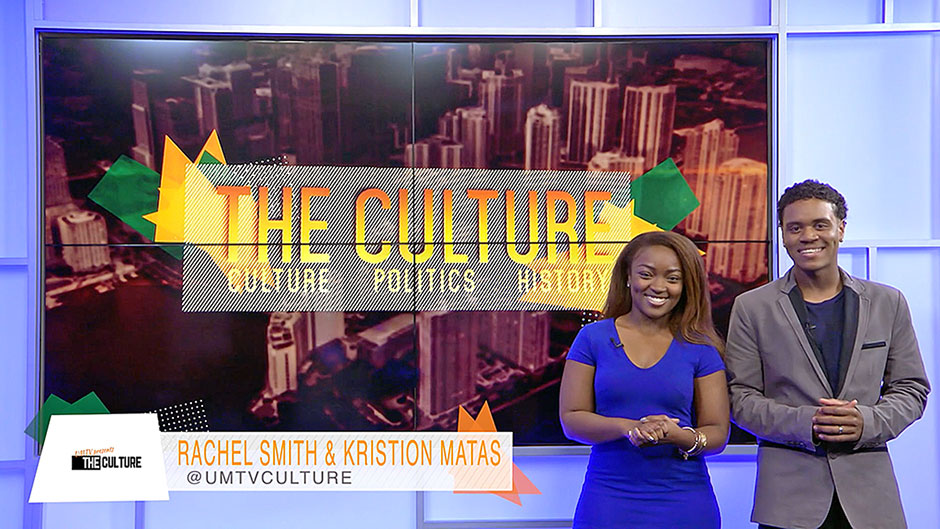“The media often depicts black people and people of color in a stereotypical and often negative way. We want to provide a space for black excellence to be shown,” stated sophomore broadcast journalism and sport administration major Rachel Smith during the closing segment of the inaugural episode for UMTV’s newest show, The Culture.
Smith and sophomore motion picture major Kristion Matas had worked on other shows for UMTV, the University’s award-winning, student-run television station which operates out of the School of Communication and broadcasts locally in Coral Gables and online. It was while sitting together at a UMTV meeting that they first discussed their longing for more diversity reflected in the station’s staff and topics.
“We don’t see as much coverage of the United Black Students events, the African Students Union events, the Caribbean Students Association, or the National Pan-Hellenic Council, and we felt like that was something that was missing; we wanted to highlight them,” Matas said.
Matas and Smith soon began developing a concept for a show highlighting the black experience at UM. They began shaping elements like “Roundtable,” partially modeled after TV One’s Sister Circle, and “Athletic Aesthetic,” inspired by Smith’s interest in sports. Throughout their pre-production research, they were surprised to see how few programs had black voices represented.
“There are not a lot of shows that talk about what's going on in the black community, which is why representation matters so much,” Smith said. “For me, growing up seeing black journalists on TV lets you know that you can do something too.”
They began pitching the concept to anyone who would listen, but things really started moving when the show’s faculty advisor, Winston Warrior, got involved.
“The University has always embraced difference, so when I think about what the show is trying to do, which is create a black voice and a vehicle by which black kids can express themselves, see themselves on TV, and have stories that can relate directly to their experience, it makes absolute sense,” Warrior said. A double UM alumnus and lecturer in the School of Communication, Warrior says he sees the same fire in Matas and Smith that he had as a student leader and does all he can to advocate on behalf of the show.
With Warrior’s support, executive producers Matas and Smith received the green light to film a pilot, but immediately they encountered an unexpected obstacle: a lack of interested students with broadcast experience.
“That is one of the unique parts of the show, that most of our cast and crew are not in the School of Communication,” said Smith.
While having a team of students from different disciplines introduces some production challenges, it also enriches the working environment. More experienced crew members are helping newbies learn the equipment and broadcast workflow.
Production crew member Morgan Threatt, a freshman broadcast journalism and public relations major, loves that The Culture is not hesitant to cover controversial topics that may make people uncomfortable, but through these conversations the show is educating students and debunking misconceptions. Thus far, the students have tackled topics ranging from gun violence to the wage gap to Beyoncé.
The crew is currently in production for the third episode of The Culture, which is among seven programs airing on UMTV. A fluctuating cohort of roughly 100 students at UMTV produce content that ranges from a live weekly newscast to a late-night comedy sketch to two Spanish-language programs.
“We want [The Culture] to be around as long as UMTV is around," Matas said, “and we want other schools to pick up on it and follow in our footsteps because we feel there needs to be an environment for students of color to talk about issues that affect them—and be taken seriously.”

